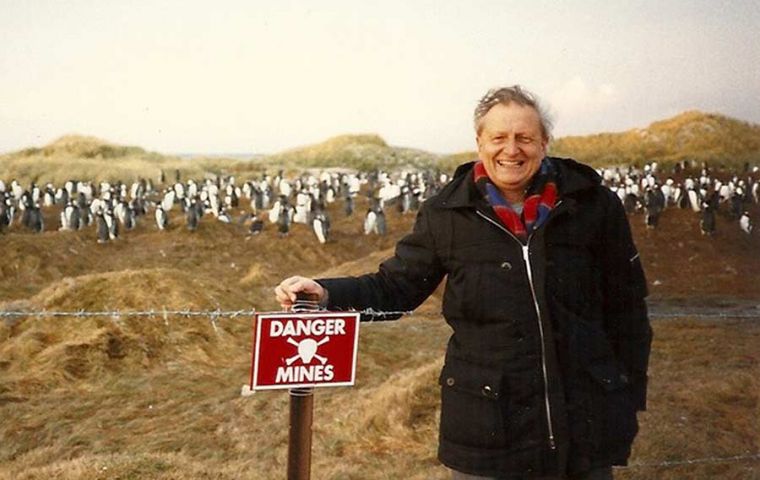MercoPress. South Atlantic News Agency
Falkland Islanders Honour Veteran BBC Journalist
 BBC Journalist Harold Briley OBE visiting Falklands
BBC Journalist Harold Briley OBE visiting Falklands By Graham Bound, London - HAROLD Briley, a BBC World Service journalist who reported from Buenos Aires throughout the 1982 Falklands War, has received a special and rare honour from the government of the Islands.
The authorities in Stanley have named a new children’s park in the city’s Sapper Hill suburb after the radio journalist. They point out that his reports from within the enemy camp were vitally important and helped maintain their morale during their darkest days almost 41 years ago.
Based in Buenos Aires throughout the two-and-a-half month war, Harold reported on all that he saw and heard, despite threats from the military government or groups working on their behalf. After the war, his dedication and bravery were recognised with the award of an OBE. But now, four decades on, the people of the Falklands have added their own special honour.
In a letter to Harold, who is now 91, the Chair of the Falkland Islands Legislative Assembly, Leona Roberts, said, “Your decision to remain in Buenos Aires, and being the first person to file the story of the invasion of the Falklands globally, on the BBC world Service, were amazing and brave acts of professionalism as a journalist.
“Some of us can remember listening to your broadcasts from Buenos Aires during the 74 days of occupation. For listeners who were caught up in a violent conflict, with no idea of what the outcome would be, how long the war would last, or whether they or their families would survive, yours was the voice of calm reassurance and British support.”
Harold had come into conflict with the Argentine junta even before the Falklands invasion. As BBC World Service’s Latin America correspondent from 1979, his reporting responsibilities ranged from Mexico to Cape Horn. But much of his work was centred on Argentina, where the far-right dictatorship was conducting a merciless campaign of murder, torture and disappearances. His reporting made him a marked man, and death threats directed at him had to be taken seriously.
In late 1981, the BBC relocated Harold and his wife from Buenos Aires to Rio de Janeiro in Brazil. But he moved back to Argentina shortly before the Falklands invasion, and was perfectly placed to tell the world about the rapidly rising tension around the islands. He is believed to be the first journalist to tell the world that the Falklands invasion was underway on 2 April 1982.
Looking back on that tumultuous time, Harold said, “To those of us familiar with Argentina, there were obvious signs that the dictatorship were determined to secure possession of the Falkland Islands by their publicly declared deadline of 1983, the 150th anniversary of British rule. The abrupt cancellation of negotiations and their fear of being overthrown in a rebellion by their own population led to their decision to invade.”
Throughout the two-and-half months of war, Harold reported the truth, questioning and often disregarding propaganda diseminated by the Argentine Government, which did not want the world to know the truth about their disastrous military adventure. His reports and those of BBC colleagues with the British task force were broadcast on World Service’s special Calling the Falklands programme, the World News and Radio Newsreel.
In the islands, Argentine forces did their best to jam transmissions and even confiscated radios. But the reports usually got through. Legislative Assembly Chair Leona Roberts explained their significance: “Your reports were eagerly anticipated favourites. We are aware that you faced death threats while in Argentina. We are also aware of the huge number of journalists who were murdered during the six years of the military dictatorship. It is amazing that you chose to maintain your journalist duties in the midst of the corruption and carnage of that society.”
Harold Briley was born in Liverpool but spent his formative years in the Isle of Man, where he met his wife Norah. After working as a local reporter covering Manx Parliamentary affairs, he moved to the Liverpool Post and Echo. He was recruited by the BBC in 1960. After various World Service postings, he became Latin America correspondent in 1979, remaining in that post to 1983. Harold retired in 1990 and settled in Battle, East Sussex, where he and Norah still live.
Responding to news of his honour, Harold said: I am delighted by the Falklands’ tribute, in acknowledgement of my 1982 broadcasts which Islanders told me gave them hope, comfort and accurate information.
“I am pleased to be associated with something that will benefit the welfare and fitness of Islanders, among whom I cherish many friendships. I have always been impressed by Falklands children for their refreshing and optimistic outlook on life. So I hope they will enjoy using the park.”




Top Comments
Disclaimer & comment rulesCommenting for this story is now closed.
If you have a Facebook account, become a fan and comment on our Facebook Page!